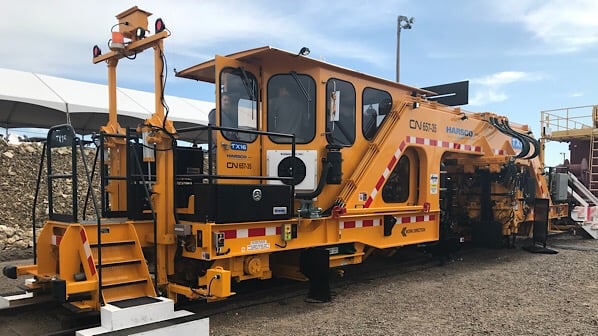Development of the project began three years ago and the resulting vehicle completely rethinks Harsco’s previous models. The cab is repositioned at the front, while the vehicle deploys fully automated tamping, integrated measurement and hybrid index, which transforms the role of the operator to largely an observer.
The four independent tamping units on two traversing frames increase productivity by 50% compared with previous models with the tamping completing work on 33 sleepers per minute during trials, although it will tamp 30 when in service. The large window to the tamping units also offers the operator an unobstructed view of the lifting hooks, tamping unit and the track while the vehicle’s eight onboard cameras provide a complete view of all areas of the vehicle. The seat in the cab also rotates 360 degrees.
Traction is provided by a 350kW Cummins 9L diesel engine and the TX16 has a top speed of 48km/h, which is aided by single-point non-contact measurements. It also offers continuous rail contact for immediate track lifting, although it lacks third rail lifting, but as the vehicle is designed for Class 1s this was not considered necessary during the development process. The tamping units are adjustable for skewed sleepers, and for use in curves, and turnouts.
The tamper is compatible with Harsco’s Callisto track geometry suite developed by its Protran subsidiary which pre recorders track geometry measurements. Currently this data is retrieved using a hi-rail vehicle and transferred and uploaded from a memory stick. However, Harsco is developing a cloud-based solution, which could use a cellular data upload process. A further optional feature for the vehicle is a drone package that allows the TX16 to act as the lead machine to a drone chase tamper.
Trials of the vehicle have taken place on a 16km stretch of NS line in South Carolina and following the show it will be transported to Winnipeg for one month of trials with CN. During the winter the TX16 will return south for further tests in Memphis ahead of deployment next summer for a year of in-service tests.

